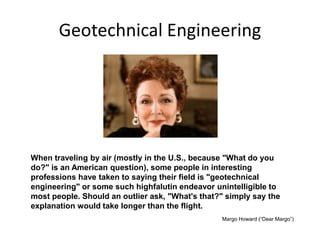Rumored Buzz on Geotheta
Rumored Buzz on Geotheta
Blog Article
The Single Strategy To Use For Geotheta
Table of ContentsGeotheta for DummiesThe Buzz on GeothetaWhat Does Geotheta Do?The 7-Minute Rule for GeothetaGeotheta Fundamentals Explained

They conduct site investigations, gather samples, perform research laboratory tests, and analyze information to assess the viability of the ground for building tasks - Consulting Engineers. Based upon their findings, geotechnical designers supply suggestions for structure style, incline stability, maintaining structures, and reduction of geotechnical risks. They collaborate with various other experts, such as engineers, structural designers, and building groups, to guarantee that geotechnical factors to consider are incorporated right into the total project design and application
By analyzing the actions and residential or commercial properties of soil and rock, they can identify possible geotechnical risks such as landslides, dirt settlement, or slope instability. Their experience helps avoid failures or crashes that might endanger lives and home. Right here are some thorough tasks and obligations of a geotechnical engineer: Site Examination: Geotechnical engineers conduct website investigations to gather information on subsurface problems.
They translate the data to recognize the homes and actions of the dirt and rock, including their stamina, leaks in the structure, compaction attributes, and groundwater conditions. Geotechnical Analysis and Style: Geotechnical engineers analyze the data gathered throughout website examinations to examine the stability and suitability of the website for construction jobs. They carry out geotechnical computations and modeling to evaluate factors such as birthing capacity, settlement, slope security, side planet pressures, and groundwater circulation.
The Main Principles Of Geotheta
Foundation Style: Geotechnical engineers play an important role in making foundations that can securely sustain the intended framework. They assess the dirt problems and load demands to determine the proper foundation type, such as superficial foundations (e.g., footings), deep structures (e.g (https://moz.com/community/q/user/geotheta?_gl=1*xkyvtd*_up*MQ..*_ga*NjU0Mjk2NzIxLjE3MjI2MDU1Nzc.*_ga_DS7K9Q3S5W*MTcyMjYwNTU3Ni4xLjAuMTcyMjYwNTU3Ni4wLjAuMA..)., piles), or specialized techniques like dirt improvement. They consider factors such as negotiation limitations, bearing ability, and soil-structure communication to develop optimum structure designs
They assess building plans, display site activities, and carry out area assessments to validate that the design suggestions are followed. If unforeseen geotechnical problems emerge, they examine the circumstance and provide referrals for remediation or changes to the design. Threat Evaluation and Reduction: Geotechnical engineers examine geotechnical risks and threats related to the task website, such as landslides, liquefaction, or dirt erosion.

Cooperation and Interaction: Geotechnical designers work very closely with other specialists involved in a task, such as architects, structural designers, and building groups. Effective interaction and collaboration are necessary to integrate geotechnical factors to consider into the general project style and building process. Geotechnical engineers supply technical expertise, answer inquiries, and ensure that geotechnical demands are fulfilled.
The smart Trick of Geotheta That Nobody is Discussing
Here are some types of geotechnical engineers: Foundation Engineer: Structure designers specialize in developing and examining structures for frameworks. They analyze the dirt problems, lots needs, and website characteristics to figure out one of the most appropriate structure kind and style, such as superficial structures, deep foundations, or specialized strategies like heap structures.
They examine the aspects affecting incline security, such as dirt residential properties, groundwater problems, and slope geometry, and establish methods to stop incline failings and mitigate threats. Quake Designer: Quake designers focus on evaluating and making structures to stand up to seismic forces. They assess the seismic hazard of a site, assess soil liquefaction possibility, and establish seismic style criteria to make certain the safety and security and durability of frameworks throughout earthquakes.
They perform area testing, collect samples, and assess the gathered information to identify the soil buildings, geologic formations, and groundwater problems at a site. Geotechnical Instrumentation Designer: Geotechnical instrumentation engineers concentrate on tracking and measuring the habits of soil, rock, and frameworks. They set up and keep instrumentation systems that check factors such as dirt settlement, groundwater degrees, slope activities, and architectural variations to evaluate efficiency and give very early cautions of possible concerns.
Geotheta Fundamentals Explained
They perform tests such as triaxial examinations, loan consolidation tests, straight shear examinations, and permeability examinations to collect information for geotechnical evaluation and layout. Geosynthetics Designer: Geosynthetics designers specialize in the design and application of geosynthetic products, such as geotextiles, geogrids, and geomembranes. They make use of these materials to enhance dirt security, strengthen slopes, supply drain remedies, and control disintegration.
They tend to be investigatory people, which means they're intellectual, introspective, and inquisitive. They wonder, methodical, reasonable, logical, and logical. Some of them are also social, indicating they're kind, charitable, participating, person, caring, handy, understanding, skillful, and friendly. Does this seem like you? Take our complimentary occupation examination to discover if geotechnical engineer is among your top profession matches.
In the office environment, geotechnical designers make use of specialized software devices to do calculations, create designs, and examine information. They prepare records, evaluation project specs, interact with customers and employee, and coordinate job activities. The office setup provides a conducive atmosphere for research study, evaluation, and cooperation with various other specialists involved in the task.
The 5-Minute Rule for Geotheta
They regularly go to project websites to carry out site examinations, assess geotechnical problems, and collect information for analysis. These brows through involve traveling to various areas, often in remote or tough terrains. Geotechnical engineers may execute soil sampling, conduct tests, and screen building and construction activities my response to guarantee that the geotechnical elements of the job are being applied correctly.
Geotechnical engineers also work in specialized geotechnical laboratories. Geotechnical laboratory engineers function thoroughly in these atmospheres, dealing with testing equipment, operating tools, and taping information.
Report this page